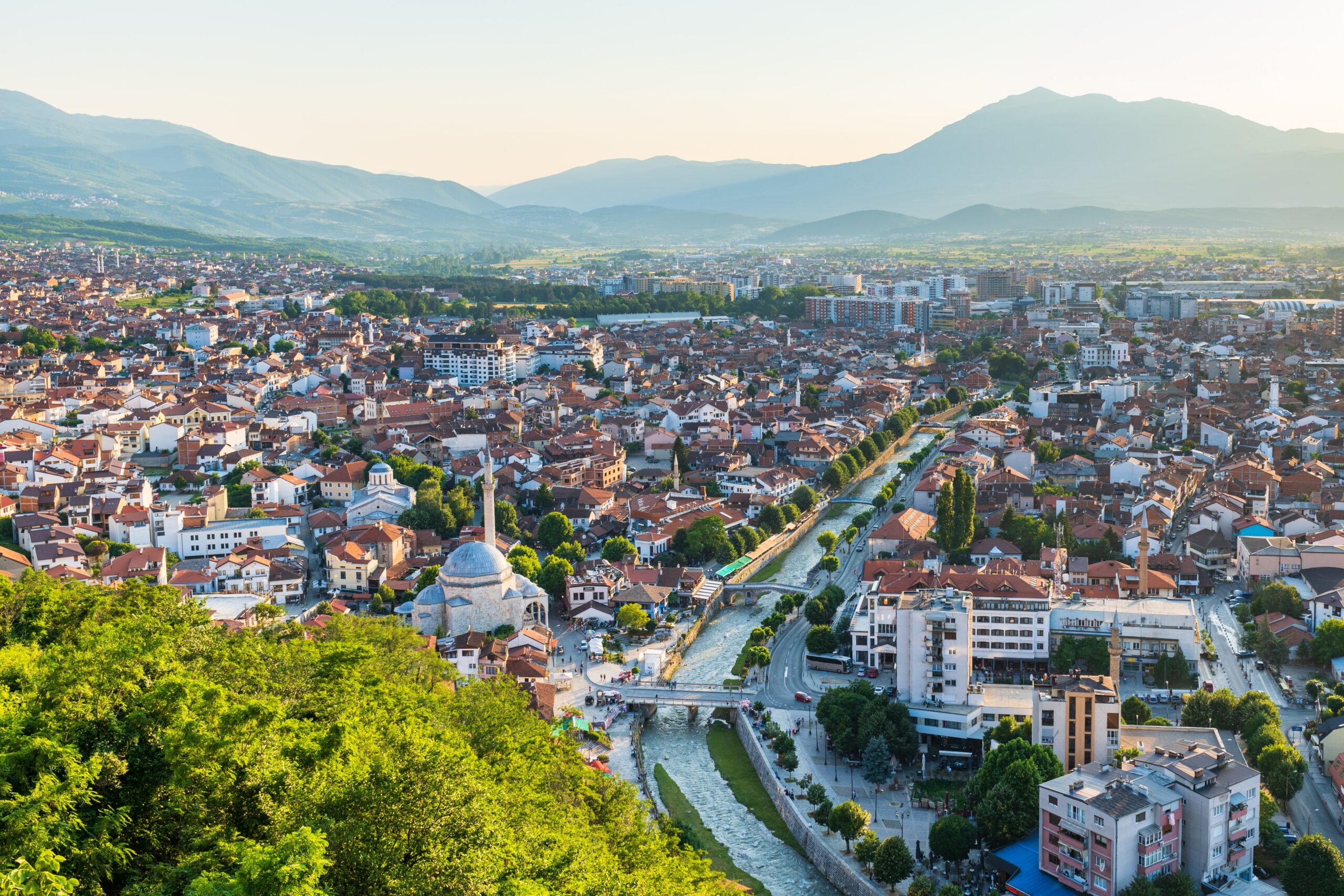Strategic Analysis Balkan Brief
First half of February 2024
Petra Bošková, Chiara Mihalčatinová, Sára Gregová, Aneta Migátová, Štefan Talarovič, Simona Škríbová, Zuzana Šmilňáková

Tirana, Albania. Photo: Shutterstock.com
Albania
Women Suicide due to Blackmail: an Escalating Crisis Facing the Nation
Recent incidents of women taking their own lives due to online harassment and blackmail facilitated by modern technology are indicative of a pervasive issue of gender-based violence that continues to afflict the Balkan country. Concerns have been raised against police forces for alleged inaction and the government in Tirana for misusing this crisis to renew its censorship efforts.
These tragedies often coincide with another alarming trend, the self-poisoning of victims with phototoxin, a highly lethal substance that is in high demand, particularly among Albanian women, for its swift incapacitating effects that hinder paramedics’ initial aid efforts. The lax enforcement of regulation of phototoxin sales in agricultural pharmacies has led to widespread availability without proper authorisation checks, as the investigative program Fiks Fare revealed.
In response to these harrowing events, women’s rights initiatives are advocating for urgent action. They emphasise the necessity of national awareness campaigns to educate the public about the gravity of online harassment and its oftentimes fatal impact on victims. Additionally, there is a pressing call for stricter penalties under the Albanian Criminal Code for those found guilty of driving someone to suicide and for media coverage to be more empathetic and responsible, thereby bolstering protection and prevention efforts.
Not only have local municipalities struggled to allocate funding for women fleeing abusive relationships, but the willingness of Albanian police to investigate the cases of gender-based violence has come into question as well. On the other hand, the ruling Socialist Party of Prime Minister Edi Rama decided to focus on the novelisation of media legislation as was promised by the Speaker of Parliament Lindita Nikolla. Civil rights groups viewed this promise as a possible revival of legislative attempts to regulate online media in 2019 when the government’s fight against defamation was seen as a tool for censoring their critics and investigative journalists. Media and legal experts concluded that the Balkan country does not have spare resources to fight against cybercrime, and inefficient implementation of the current laws associated with a low level of media literacy is at fault.
Sources:
- Adigun, Olalekan. 2024. “A Nation Mourns: The Tragic Consequences of Online Harassment and Blackmail.” BNN Breaking. https://bnnbreaking.com/world/albania/a-nation-mourns-the-tragic-consequences-of-online-harassment-and-blackmail.
- Bogdani, Nensi. 2024. “Albania’s Socialists Accused of Misusing Suicide to Renew Online Censorship Drive.” Balkan Insight. https://balkaninsight.com/2024/02/02/albanias-socialists-accused-of-misusing-suicide-to-renew-online-censorship-drive/.
- Sinoruka, Fjori. 2024. “Trend of Albanian Women Suicides Caused by Men ‘Worrying’, Experts Say.” Balkan Insight. https://balkaninsight.com/2024/02/12/trend-of-albanian-women-suicides-caused-by-men-worrying-experts-say/
Bosnia and Herzegovina
Corruption Perceptions in Bosnia and Herzegovina
Corruption in Bosnia and Herzegovina is a pressing issue highlighted by Transparency International’s Corruption Perception Index (CPI). The country confronts substantial challenges in combating corruption and improving public perceptions. Bosnia and Herzegovina rank poorly in the region, with a CPI score of 35, indicating a significant decline in perceptions of corruption over the past decade.
The decentralised system of ethnic power-sharing in Bosnia contributes to the complexity of addressing corruption. Effective anti-corruption efforts require seamless coordination among various institutions, which is often lacking. Insufficient legal and institutional frameworks further hinder the fight against corruption.
While Bosnia and Herzegovina struggles, other Balkan countries have experienced stagnation in addressing corruption. Albania has made progress with investigating and addressing high-level corruption cases, earning a score of 37. Kosovo, ranked 83rd with 41 points has implemented legal reforms but faces challenges in convicting influential individuals involved in corruption. Montenegro leads the Western Balkans with a score of 46, emphasising the need for continued anti-corruption efforts in the region.
To tackle corruption in Bosnia and Herzegovina, a comprehensive approach is necessary. Strengthening institutional structures and implementing robust regulations are essential steps in curbing corruption. Cooperation among oversight bodies and increased transparency in public administration are crucial. Additionally, fostering a culture of integrity and accountability in both the public and private sectors is key to establishing a sustainable anti-corruption environment.
In conclusion, Bosnia and Herzegovina grapples with significant challenges in addressing corruption and improving public perceptions. The decline in corruption perceptions underscores the urgency for comprehensive reforms and a collective commitment to combating corruption.
Sources:
- Milica Stojanovic, Balkan Insight, „Little Change in Balkan Corruption Perceptions Bar Decline in Bosnia“, https://balkaninsight.com/2024/01/30/little-change-in-balkan-corruption-perceptions-bar-decline-in-bosnia/

Sarajevo, Bosnia and Herzegovina. Photo: Shutterstock.com
Kosovo
Kosovo’s Euro Transition and Closure of Belgrade-Run Offices Spark International Concern
The EU and US have urged Kosovo to refrain from unilateral actions concerning decisions impacting the Serbian community, aiming to prevent the escalation of tensions. The international community stresses the significance of addressing matters like the Euro becoming the exclusive official currency and the closure of Serbia-operated ‘parallel’ structures through EU-mediated Dialogue.
Kosovo has been utilising the Euro since 2002, however, residents in Serb-majority municipalities, particularly in the north, commonly use both Serbian dinars and the Euro. Furthermore, many individuals depend on financial assistance from the Serbian government, often provided in cash and in dinars.
Despite international appeals for a delay, the new currency regulation came into effect on February 1. During an unspecified transitional period, individuals will not face penalties for using dinars, and monetary flows from Serbia will not be prohibited.
The OSCE recognised Kosovo’s willingness to implement a transitional period and improve communication to prevent confusion for affected individuals. However, it reminded Kosovo of its duty to uphold minority rights, including ensuring all public communications in both official languages, Albanian and Serbian.
Kosovo Central Bank Governor Ahmet Ismaili clarified that the regulation targets money laundering and terrorism, not the Serbian community. He encouraged Kosovo Serbs to participate in the financial system, citing that many already benefit from pensions and aid. Ismaili stressed that individuals are not barred from using dinars as long as transactions are legal. The decision aims for transparent aid reception from Serbia to benefit citizens.
The international community has also urged Prishtina to refrain from unilateral actions against Serbian “parallel” structures and called for both Kosovo and Serbia to address this issue through EU-mediated Dialogue.
Serbian parallel structures in Kosovo refer to a network of institutions operated and funded by Belgrade, which operate alongside Kosovo’s official institutions. The institutions provide social and health services to members of non-majority communities.
On February 2, 2024, police shut down Serbia-operated parallel structures in three municipalities – Pec, Istok, and Klina. Kosovo authorities hailed this as a move toward legality, seizing documents and computers allegedly violating Kosovo’s laws. Documents featured the Serbian government’s emblem or referenced illegal parallel structures established by Serbs but unrecognised by Kosovo. Serbia and Kosovo Serb representatives denounced it as illegal and violent.
The international community views these actions as needlessly escalating ethnic tensions. They emphasise that matters concerning Serbia-supported structures in Kosovo should be addressed through the EU-facilitated Dialogue. US officials caution that they may restrict their efforts to advocate for Kosovo on the global stage.
Kosovo officials have accused the EU of double standards. Ardita Sinani, an advisor to Kurti, claimed on Facebook that while the EU officials urge Kosovo to cease closing Belgrade-run structures, it remains silent on the passivisation of ethnic Albanian addresses in southern Serbia.
The EU and US urge Serbia and Kosovo to implement agreements President Aleksandar Vučić and Prime Minister Albin Kurti reached last year. However, progress in the EU-mediated talks has stalled. Both countries aspire to join the EU, but the bloc’s foreign policy chief, Josep Borrell, has cautioned that their unwillingness to compromise jeopardises their prospects.
Sources:
- Bami, Xhorxhina. BalkanInsight, „Kosovo Euro Rule, Closure of Belgrade-Run Offices, Draw International Criticism“, https://balkaninsight.com/2024/02/05/kosovo-euro-rule-closure-of-belgrade-run-offices-draw-international-criticism/
- ABC News, „Kosovo’s block on the Serbian currency raises the alarm in the EU and US“, https://abcnews.go.com/International/wireStory/kosovos-block-serbian-currency-raises-alarm-eu-us-106933729
Montenegro
The Montenegrin Real Estate Sector is at Risk of Money Laundering
On February 1, MONEYVAL, the Council of Europe’s anti-money laundering body, published a report calling on the Montenegrin authorities to strengthen measures to combat money laundering in the country’s real estate sector. Investment into the real estate sector was identified as the country’s most frequent method for money laundering.
Montenegro’s real estate sector has been growing for years, mainly due to low real estate tax rates (property tax rates range from 0.25% to 1%, one of the lowest in Europe) and citizenship benefits – Montenegro’s citizenship can be granted via the combination of a financial contribution to the government and an investment in real estate projects. This pro-market-oriented environment attracted a vast number of foreign investors, and the value of the real estate market in Montenegro is projected to reach a staggering 22,54 billion by the end of this year. Furthermore, the annual growth rate for the period 2024-2028 is estimated to be 5,41%, suggesting a positive outlook.
A positive outlook together with lax legal control, made the real estate market prone to suspicious financial transactions. For instance, in December 2023, BIRN reported that Montenegro’s real estate market has profited from multi-million-dollar purchases by affluent foreigners utilising digital currency. Those digital transactions are difficult to investigate, as Montenegro’s cryptocurrency market is not yet legally regulated. It appears that the regulation will not occur anytime soon, as the Ministry of Finance was unable to provide any timetables for enacting such legislation (in January 2024).
MONEYVAL, in its report, warned that the lack of money laundering investigations and convictions poses a serious threat to the rule of law in Montenegro since it creates a thriving environment for money laundering threats, e.g. drug trafficking, loan sharking, evasion of taxes, and corruption. Furthermore, other findings also suggest the existence of organised crime groups that may manipulate the real estate market in a way that cannot be fully trackable due to legislative shortfalls.
Sources:
- Samir Kajosevic, Montenegro’s Real Estate Sector is Vulnerable to Money Laundering – Report, https://balkaninsight.com/2024/02/01/montenegros-real-estate-sector-is-vulnerable-to-money-laundering-report/
- Statista, Real Estate – Montenegro, https://www.statista.com/outlook/fmo/real-estate/montenegro
- Srdjan Jankovic, Montenegro’s Crypto Dream Is Hanging In The Balance, https://www.rferl.org/a/montenegro-cryptocurrency-bitcoin-legislation-ethereum/32799507.html
- Council of Europe Portal, Montenegro should step up efforts to investigate and effectively prosecute money laundering and strengthen the supervision of high-risk non-financial businesses and professions, https://www.coe.int/en/web/moneyval/-/montenegro-should-step-up-efforts-to-investigate-and-effectively-prosecute-money-laundering-and-strengthen-the-supervision-of-high-risk-non-financial-businesses-and-professions

Prizren, Kosovo. Photo: Shutterstock.com
North Macedonia
The First Ethnic Albanian PM appointed as the Head of the Technical Government ahead of the Elections
Talat Xhaferi became the first ethnic Albanian prime minister of North Macedonia on January 28, 2024. He will lead a new government with a technical mandate charged with preparing both the parliamentary and the presidential elections for a hundred-day long term following the resignation of the former prime minister Dimitar Kovachevski’s cabinet. This change occurred due to the 2015 Przino political agreement, according to which the government in North Macedonia is being switched a hundred days before the parliamentary elections to prevent political disputes. Prior to assuming the role of a caretaker prime minister, Xhaferi served as a speaker of the country’s Parliament.
Xhaferi is an essential representative of the largest political party of ethnic Albanians in North Macedonia, the Democratic Union for Integration, DUI, alongside the party’s leader, Ali Ahmeti. The current prime minister joined the party after an armed insurgency in 2001, during which he fought together with Ahmeti in the Albanian National Liberation Army. Nicknamed “commander Forina” because of his hometown, Xhaferi was given an amnesty as all the other insurgents as a part of the Ohrid peace agreement, which ended the conflict and entered politics through the DUI. The party served as a junior coalition partner to the Social Democratic Party, SDSM, which had previously ousted the VMRO-DPMNE party from power.
Xhaferi’s position as a head of the technical government was agreed on in 2020 by the leaders of the Social Democratic Party, SDSM, and the Democratic Union for Integration, DUI. Although agreed beforehand among the coalition parties, the members of the Parliament from the largest opposition party, VMRO-DPMNE, have suggested their own candidate as they expressed their opposition to Xhaferi’s candidacy. In the end, the votes favouring the new prime minister were 65 out of 120.
Ahead of the election season, North Macedonia finds itself in a difficult position regarding its accession process to the European Union. More than twenty years after the conflict between its most prominent ethnic groups, the new prime minister might stir controversy among the voters.
Sources:
- Fatjona Mejdini, Balkan Insight, “Talat Xhaferi, Taboo-Breaker who Became North Macedonia’s First Albanian PM”, https://balkaninsight.com/2024/01/29/talat-xhaferi-taboo-breaker-who-became-north-macedonias-first-albanian-pm/
- Radio Free Europe/Radio Liberty, “North Macedonia’s Parliament Elects First Ethnic Albanian PM”, https://www.rferl.org/a/macedonia-first-albanian-prime-minister/32795309.html
- Radio Free Europe/Radio Liberty, “Government Of North Macedonia Resigns Under Road Map For General Elections”, https://www.rferl.org/a/north-macedonia-government-residents-roadmap-elections/32791873.html
Serbia
European Parliament Resolution Presses for Probe into Serbian Election Integrity Following Fraud Allegations
On February 8, the European Parliament adopted a resolution expressing significant reservations regarding the integrity of the latest Serbian elections. MEPs have raised alarm over reported instances of voter intimidation, irregularities in voter registration processes, and concerns about media impartiality. The resolution also threatens to suspend Serbia’s EU funding if the country fails to cooperate or if the state authorities are found guilty of election fraud.
The European Parliament called for “an independent international investigation by respected international legal experts and institutions into the irregularities of the parliamentary, provincial and municipal elections, with special attention to the elections to the Belgrade City Assembly, as certain allegations, including those regarding organised voter migration at local level, go beyond the scope covered by the OSCE/ODIHR reports”. The resolution, which was adopted with 461 votes “for” and 53 votes “against”, also mentions the deployment of a fact-finding mission with the assistance of the Parliament.
Serbia held the parliamentary election on December 17 2023, with the ruling Serbian Progressive Party of the populist Serbian President Aleksandar Vučić winning by a large margin. The result sparked mass protests in the country, and numerous domestic and international observers reported voting irregularities.
For example, the international observation mission, which included representatives from OSCE, the European Parliament and the Council of Europe, reported that the pre-election campaign was “dominated by the decisive involvement of the president, which, together with the ruling party’s systemic advantages, created unjust conditions”. The observers also said that “instances of serious irregularities, including vote-buying and ballot-box stuffing, were observed. Measures for ensuring vote secrecy were insufficient”.
Moreover, the independent Center for Research, Transparency and Accountability (CRTA) said that organised voter migration from neighbouring regions and countries had significantly influenced the voting outcome in Belgrade, stating that the election in the capital did not represent the views of the capital’s citizens.
Serbia’s Prime Minister Ana Brnabić rejected the resolution and criticised the opposition representatives by stating that “resolutions come and go — this is not the first, nor will it be the last, but it will forever be recorded that there were political parties and people in Serbia who sought the abolition of the sovereignty of their own country.”
Sources:
- Sejla Ahmatovic, POLITICO. “Serbian opposition warns of ‘dictatorship’ as European Parliament urges election probe”, https://www.politico.eu/article/ep-resolution-last-straw-before-dictatorship-serbian-opposition-says/
- The European Parliament, Joint Motion for a Resolution, 7.2.2024, https://www.europarl.europa.eu/doceo/document/RC-9-2024-0106_EN.pdfLili Bayer, The Guardian. “Serbia’s elections held under ‘unjust conditions’, say international observers”, https://www.theguardian.com/world/2023/dec/18/serbias-elections-under-unjust-conditions-say-international-observers
- Milica Stojanovic, Balkan Insight. “European Parliament Urges International Investigation Into Serbian Election Fraud Claims”, https://balkaninsight.com/2024/02/08/european-parliament-urges-international-investigation-about-serbian-elections/
- Organisation for Security and Cooperation in Europe, “Serbia, Early Parliamentary Elections, December 17 2023: Statement of Preliminary Findings and Conclusions”, https://www.osce.org/odihr/elections/serbia/560650

Contact us